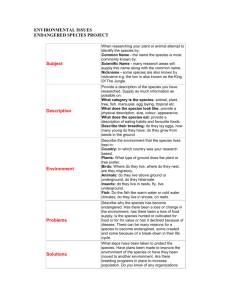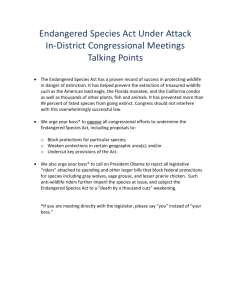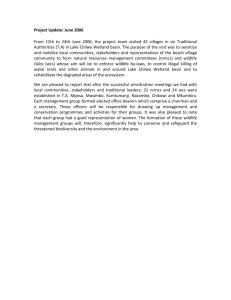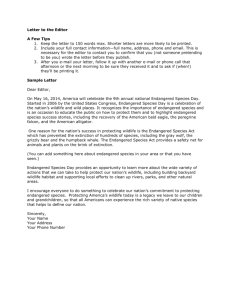Growers: An Endangered Species
advertisement
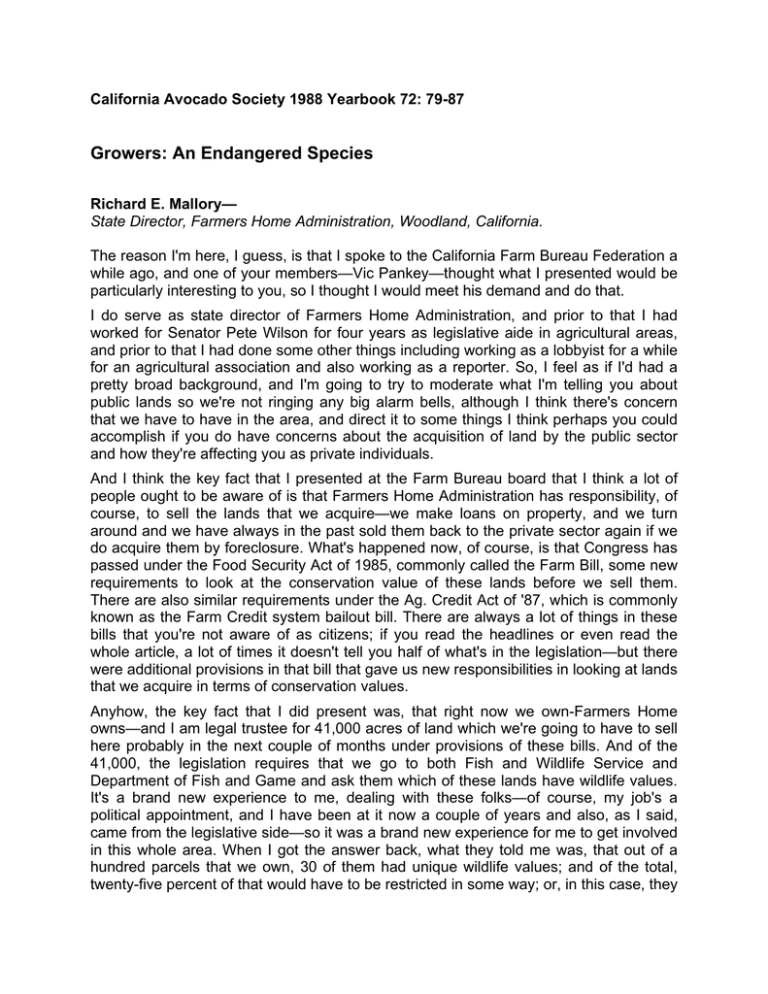
California Avocado Society 1988 Yearbook 72: 79-87 Growers: An Endangered Species Richard E. Mallory— State Director, Farmers Home Administration, Woodland, California. The reason I'm here, I guess, is that I spoke to the California Farm Bureau Federation a while ago, and one of your members—Vic Pankey—thought what I presented would be particularly interesting to you, so I thought I would meet his demand and do that. I do serve as state director of Farmers Home Administration, and prior to that I had worked for Senator Pete Wilson for four years as legislative aide in agricultural areas, and prior to that I had done some other things including working as a lobbyist for a while for an agricultural association and also working as a reporter. So, I feel as if I'd had a pretty broad background, and I'm going to try to moderate what I'm telling you about public lands so we're not ringing any big alarm bells, although I think there's concern that we have to have in the area, and direct it to some things I think perhaps you could accomplish if you do have concerns about the acquisition of land by the public sector and how they're affecting you as private individuals. And I think the key fact that I presented at the Farm Bureau board that I think a lot of people ought to be aware of is that Farmers Home Administration has responsibility, of course, to sell the lands that we acquire—we make loans on property, and we turn around and we have always in the past sold them back to the private sector again if we do acquire them by foreclosure. What's happened now, of course, is that Congress has passed under the Food Security Act of 1985, commonly called the Farm Bill, some new requirements to look at the conservation value of these lands before we sell them. There are also similar requirements under the Ag. Credit Act of '87, which is commonly known as the Farm Credit system bailout bill. There are always a lot of things in these bills that you're not aware of as citizens; if you read the headlines or even read the whole article, a lot of times it doesn't tell you half of what's in the legislation—but there were additional provisions in that bill that gave us new responsibilities in looking at lands that we acquire in terms of conservation values. Anyhow, the key fact that I did present was, that right now we own-Farmers Home owns—and I am legal trustee for 41,000 acres of land which we're going to have to sell here probably in the next couple of months under provisions of these bills. And of the 41,000, the legislation requires that we go to both Fish and Wildlife Service and Department of Fish and Game and ask them which of these lands have wildlife values. It's a brand new experience to me, dealing with these folks—of course, my job's a political appointment, and I have been at it now a couple of years and also, as I said, came from the legislative side—so it was a brand new experience for me to get involved in this whole area. When I got the answer back, what they told me was, that out of a hundred parcels that we own, 30 of them had unique wildlife values; and of the total, twenty-five percent of that would have to be restricted in some way; or, in this case, they said fifteen and a half percent they recommended we just deed to them. [Laughter.] True. It's true. And you know, that's kind of a shocker, I guess, if you think of it. I don't want to overstate the fact. You know, I am an administrator, and I'm here to carry out the law, and, you know, if Congress says, you know, they want additions of lands for migratory waterfowl, whatever, I'm going to be there carrying it out. That's my job as an administrator. But, you know, as a private individual I say to myself, "Well, gosh, these lands are just randomly acquired all over the state of California and they represent every kind of agricultural land and, you know, there's no special concentration in any one crop or area whatever." And if I say to myself, "Well, if 25% of our lands are basically conservation easement type of lands, then what do they think about agriculture as a whole?" I've got to believe that they think maybe 25 % of what we are farming now should be restricted in some manner, which to me is shocking. I think the other thing that bothered me about the whole thing is that they view it as.. ."they" being, in this case, Fish and Wildlife Service—the civil servants, bureaucrats, whatever you want to call them that work for that agency.. .view it as something that's done at no cost to you, the taxpayer. And of course that's ridiculous, because ours is a loan program; when our funds are appropriated, people say, "Well, it's a loan program, so we just subtract loan losses and then we get the rest of it back." That's all that's looked at in the budget, is what are the loan losses as our cost. So if we're advancing money and we then foreclose on property and we can't sell it, then there is a cost there—it's a hidden cost, it's an off-budget cost; but that's the way it's viewed by both Congress and by the agency—Fish and Wildlife Service—is that when we get something back, if we give it to a public purpose, then it's no cost to you. Which is not true. There are more things than just our provisions, I think. That's my basic concern. Again, I don't want to ring any big alarm bells, but it's a cause for vigilance, I feel, by groups like you, and by the average citizen. They ought to know these things, that not only do we have, say, the Food Security Act that affects Farmers Home, because I would suspect with few exceptions there are no Farmers Home borrowers in this group. And it does affect ASCS, which is, you know, the so-called crop payments that everybody is aware of; and I would suspect that with few exceptions there are no ASCS recipients in this group. But one of the things that I have learned is, that there's a continuing federal emphasis away from Farmers Home emergency loans, when you folks have freezes that you've had in the past couple of years, towards federal crop insurance, which is a slightly subsidized program, and it is basically a direct federal policy that this is how growers ought to cover their losses. And federal employees pay for advertising, go out and talk to you, encourage insurance agents to go out and talk to you about crop insurance and how important it is to you. Well, when you do get involved in that, you do get involved in this process. The Food Security Act for crop insurance requires you to look at whether you're fanning highly erodible land, whether you've got conservation practices, whether you're converting wetlands, and also what your impact is on endangered species. So there is a growing federal involvement, and it's always creeping around the edges there. Of course, one of the things I'd like to say about this administration is that we try to bring common sense to the picture as far as we can and to make things work in a realistic way. I can't say, you know, what the future would hold; but, you know, we've all been through different administrations and things change and creeping things can some day grab you, so you've got to be aware of them and be ready to deal with them. Let me talk to you about my greatest concerns, and hopefully be fairly specific about some areas where I feel that this sort of growing emphasis could affect you and your private lands. Number One is the Endangered Species Act, and I'll start with Farmers Home programs because I know them the best. Number one, if you did come in for a direct loan with Farmers Home, EPA is pushing us to get formal studies of impacts on endangered species before we make a loan, which would mean we would have federal people going out to your property to look at it to see what endangered species might be in the area or what impact you might have on endangered species. Likewise, if you came for a guaranteed loan—not a direct loan—with us, the same process likely in the future will be applied. It's not being applied right now. Thirdly, at some time in the past maybe you got, say, a Farmers Home emergency loan or a SBA loan. Maybe it's part of your total credit package.. .you've got to refinance.. .you've got to do something on the farm.. .somehow you've got to modify that note: we can draw you in at that point. I said "crop insurance"; you can be drawn in at that point. I guess in this area there are additional points where you could be drawn into the process; if, say, you want a re-zoning or something and have to go in and do an EIR or EIS. The EPA is going through and modifying pesticide labeling regulation, and if you want to use pesticides in the future, those labels are going to specify what you can and what you can't use. I'm not exactly sure of the pesticide situation with regard to avocados, but I do know with many crops there's only one or two effective chemicals left for weed control or pest control; and if by chance you're one of the unlucky ones that has an endangered species somewhere in the neighborhood, it's going to be very important to you how a regulator looks at the question of that endangered species and your farming and how it impacts on those endangered species. Basically, I think a key question in the whole thing is bringing common sense to finding out when is one present, and that's an area where I've been shocked, too; and I'll give you a couple of specifics and read to you from a couple of letters that we've gotten from Fish and Wildlife Service who've gone out and inventoried properties that we have. The first property was one that we have.. .it's a coastal property, and may be similar to a lot of ones in San Diego County. This one happens to be in Santa Cruz County. So Fish and Wildlife Service basically, when they do these reviews of each property, they come out and they give me a letter, and it names the property, and it goes through a resources assessment, and page after page of recommendations, and what I ought to do about it. Well anyhow, the endangered section is always pretty interesting to me. This one says, "Based on our evaluation of the site and its habitat conditions and our review of the information available on known populations and sightings of endangered species, we have concluded that the federally-listed endangered species, Santa Cruz long-toed salamander, probably exists on the property. The species would benefit by management practices to expand the riparian corridor. The Santa Cruz long-toed salamander is one of the most endangered amphibians in the state of California. Restrictions of grazing, cropping, and construction on the western 17.4 acres of the property and management for this species will result in creation of prime habitat— creation of prime habitat—for the endangered Santa Cruz long-toed salamander, may facilitate down-listing, and will assist in its recovery," etc., etc. And then it basically cites that the 250-acre Ellicot Slough National Wildlife Refuge, and ecological reserve managed by Fish and Wildlife Service, is located about 15 miles from the property. Fifteen miles. And probably exists. And may restore. All right? Here's another letter. This one….I don't have any right now in San Diego County, thank goodness—inventory properties...but this one was Tulare County, same kind of thing. The letter says, "Based on our evaluation of the site and its habitat conditions and our review of the information available on known populations and sightings, we have concluded that the federally-listed blunt-nosed leopard lizard was recently sighted on the south boundary line. Although not observed on the site inspection, the other species, the endangered San Joaquin kit fox, the proposed endangered Tipton kangaroo rat. an endangered plant [which I won't pronounce], are likely to be on the farm as they are found within two miles of the area." And that's what we're getting. Now basically, an administrator...I don't want to belabor this point, but I do want to say, you know, the endangered Species Act applies to me personally in that if I violate a provision of the Endangered Species Act, I can be sued personally for violation of the Act. You could too, as private land owners, if you developed something; but I mean me in the exercise of my job, just in sale of an inventory property, if they decide that I'm bad enough, they can recommend that I be sued for it. This is the quality of the information I'm getting. We get a biologist who goes out there, and they say, "We saw one. It was within two miles." Or, "There was a carcass. It was on the adjoining property." Or, "Someone saw one of these endangered species overfly the property." I mean, it is incredibly difficult for me to try to balance out, what am I going to do with this stuff? And, if we know its a habitat that an endangered species is on, actively using, then it's easy. If you know it's a habitat that, say, has some specific plant that this endangered species is only known to live on, then it's easy. But what I'm getting at is, if it's within two miles, it's within three miles, it's next door, it's been seen there once. And it's awfully hard to bring common sense to a situation like that. It's like a game of "bluff," basically; and that's about where it stands. I mean, in terms of dealing with Fish and Wildlife Service, we're having to just sit down and kind of bluff. We say, "Well, we don't think it is." And they say, "Well, we think it is." And then we say, "We don't think we should," And they say, "Well, we're going to sue you if you don't." And we say, "Well, how about some other alternatives?" So, we're basically trying to negotiate this thing without any rules, and it's awful darn hard. Anyway, there's one issue that I think deserves some attention by groups like yours, and I'll tell you some specifics how I think you could do that later. Another issue is wetlands. That's a big one. On the way, Larry Rose brought me in here, and he was commenting how the Mission Bay was once a wetland, which is true. You couldn't develop this today; you'd be sued under the endangered Species Act. Likewise, the U.S. Department of Agriculture Building in Washington sits on converted wetland, and you couldn't put the building there or could you put the Jefferson Memorial or any of the other things that are there today any longer. But we have new standards on wetlands. It makes me wonder, because I know...in fact, I contacted the State Department of Fish and Game, I said, "How many acres in California were once wetland?" They said, "Five million." I said, "How many are left?" They said, "Five hundred thousand." So, we've got four and a half million acres, and I'll bet you 99% of that is farm that once was a wetland. Now, it depends how we have to administer this thing, but if the federal system or a state system through whatever means is going to actively require agencies like Farmers Home to convert this stuff back, we're going to be in a world of hurt. I don't know what I would do if somebody came in and they said they had a farm property that has "X" value, they want to take a loan against it, and we were to determine that it was once a wetland that they had converted; basically we would know in the back of our mind if we ever foreclosed, Fish and Wildlife Service would come and say, "Aha! Converted wetland. Restore it." So, it has no value as loan security, really. But, I don't know what we would do with that situation. Luckily, we haven't had it yet; but I do suspect we will some time in the future, and it's going to be darn tough to deal with. There's a lot of areas that for sake of time I'm not going to mention all of them. Artificial wetlands is one that's particularly interesting to me. That's where perhaps...well, the most...you know, you always look for the worst example. The worst example I can think of is a little ten-acre property that we had acquired in Fresno County, and the county had come through and built a road, and for a part of the road they had to raise the elevation of it through a natural sort of a depression, and it created a natural dam. They put a little culvert under it, but it didn't quite drain the water away, so it backed some water up on the property and created a little marsh of about an acre. And it's got cattails in there and everything else. Well, when we took it back, Fish and Wildlife Service came in and said, "Aha! A wetland." We said, "It's not a wetland. It was a farm for years and years. It was naturally drained, and it's just the building of this road that created it." And they said, "Uh-uh. That's not the way the law works." It works that if there's a wetland by these definitions, you've got to restore it or give it to the public—them, Fish and Wildlife Service, to manage the wetland. So, we will do that—I think. I'm not sure. Again, it's little bit like "bluff." We're trying to figure out what we have to do, and what are they going to do to us if we don't. But there it is, and we're trying to deal with things like that. Buffer zones are another interesting one that are mandated in many cases. Buffer zones are something that can easily be overdone. We have a property up in Siskiyou County, the far north of the state, where the drainage goes in two directions—it kind of goes this way and this way. On the lower edge of the one drainage there is a true wetland of about ten acres. So we told Fish and Wildlife Service, "Sure, we can deed restrict that one;" and then they said, "Well, we want a buffer strip." Well, we said, "Well, how big?" They said, "Well, how about 400 acres?" That's the whole property, you know? Even from a wildlife standpoint, we've got a buyer who's willing to accept the property with the wetland restricted—with the drainage in this land totally restricted from any other use, as long as he can grow alfalfa and some field crops on the drainage 300 acres in the other direction. Which makes perfect sense; it would be good pheasant habitat, it wouldn't affect the wildlife in any way, it's not a converted wetland; and in our view, they have plenty of buffer strip. Well, so far Fish and Wildlife has said "no." So again, we le back to "bluff," you know: Yes, you know, they want us to...no, we don't want to...what are you going to do to us if we don't? I don't know, frankly; but that's what we're pushing for; and that's another big issue, 1 think. Riparian lands...that's an area of continuing emphasis throughout the state. I guess one of the things that I shortcut in my notes here that I ought to jump back to is, it isn't just the federal government. There are many things going on in the state government. And of course I don't track them that closely because my focus is on my superiors in Washington, but I know that there has been a state bill passed recently that mandates all state agencies to look for and carry out a fifty percent increase in wetlands and riparian lands over the next, I believe it's 20 or 30 years. That's a long term policy of the state. Basically, with the passage of this bond initiative that just passed in the last election, now they have some money to go ahead and do that. My concern there is, you know, if this happens without you folks being aware of what's done, somebody can come out—perhaps—and buy a parcel of land in the middle of your land, or adjoining your land, restore it to whatever—wildlife condition, then for whatever reason all of a sudden a wildlife species start overflying your property or whatever; and then the next time you want a loan or crop insurance or something, you've got problems. And maybe these little blunt-nosed leopard lizards come across your property sometime, and then you've really got a problem. And, you know, that's a concern to me, too. I mean, I think the important thing—the key to my speech, the key thing that I wanted to tell you is, that you folks have to be involved in the process. You know, it's a big subject. I can't, even though it's a large part of what I do every day, it's bigger than I can deal with in the amount of time I have and the time my staff has, I'm sure far exceeds the amount of time that you have personally to deal with it. But there are some things you can do and should do if it concerns you. And Number One is, you know, like this meeting—take an interest, learn a little bit about it, and discuss it with people. If you discuss it, then it becomes at least an issue to your representatives in the legislature, Congress, and they're aware of it. They're aware you're watching them and what they do. If an issue develops on a piece of property that's close to you, you can directly write to your county supervisor, your assemblyman, whatever, and demand that they exercise common sense; because, like I'm saying, I'm telling you about Farmers Home perspective, but a lot of federal agencies, and a lot of people in my position are exactly in my position, that they have a conflicting demand that's put upon them, and they have to make a decision. They don't know exactly how to respond, and the rules aren't clear. And I'll tell you one thing, that if you got a situation like that, and the public is involved, you're going to get a far different answer than as if you've got a situation like that and nobody cares. And I'll tell you that's true. You can vote, of course; which I'm sure most of you do. I had a long discussion with California Farm Bureau, and they expressed a little bit of interest in this. They've got a lot of issues to fight, too. I had a discussion with their legislative director, and we kind of kicked around a lot of things that we could do—you know, we could do, people who are concerned could do to exercise some control over this situation. And it's funny that the answer we came up with is that the easiest thing— the easiest thing—would be if there were a requirement for the government to report on itself. The two easiest things the government will do is issue reports and hold meetings; and you say, "Well gosh, how can that possibly help me?" Well, if either at the state level or at the federal level, all the government agencies were required to get together and discuss in a public session their plans for acquisition of properties in each county, at least you'd be aware of it. You wouldn't have to do the work. All you'd have to do is wait for the meeting, go to the meeting, find out what they plan to do, and then you could comment on it. That's the best situation for citizens who are wanting to be involved in an area, is that you don't have to do the work because you don't have the time. And that's what government should be doing, they should be telling you, you know, that they're planning to acquire these acres for wildlife marshes, or they're planning to sell these acres for a new conservation area. You shouldn't find out about it after it's done. So I would say that's probably the Number One area, if you were to get involved, is that you could require public notice in some manner, of future land acquisitions. You could ask that for every acre that government acquires, that they have to sell one acre. There are a lot counties in California that have 50% or better, or 90% or better, government ownership. I guess my political persuasion says that isn't right. Some people think it's, you know, the most desirable thing that could be, but I don't. I think it's wrong. And if you feel that way, that's certainly something you could do. I know for a fact that I had a discussion with Bureau of Land Management here in the state, and I asked them, "Gee, do you have any property that you're going to be selling in the near future?" Their response to me was, "Well, we have 500,000 acres that we have determined are surplus to our needs and"...(what did they say?)... "impractical to administer." And I said, "Well, what are you going to do with it?" And he said, "Well, we're holding it for land trades." And I said, "Well, suppose Farmers Home had to donate some of the lands that we have for new conservation purposes, would you be willing to release some of that to sale?" And the answer was, "Well, maybe if you released it to our management, the Bureau of Land Management; but if you were going to release it to some other agency, we don't think so. We wouldn't be excited about that." Well, I guess in my mind as a citizen, I'd say, "If you've got 500,000 acres you don't need and you can't manage, what are you doing with it anyway?" You know, we've got this huge deficit that exists, and I think there's a lot of agencies are like that. They look at their own turf, and their own situation; and if citizens were aware of that, I think they could do something. Anyway, that's another area for interest. Oh, and one more thing on legislation. You could, through organizations like this, find out what the definitions that are being used are for wetlands and riparian lands in your county, and how they're being administered; and maybe ask your legislators to rewrite those definitions legislatively. That's the best thing for somebody like me, is if there's a legislative definition, then I don't have to worry about it. I just say the legislation says this; this is what we're going to do. Where we have a problem is, where the legislation says, "restore wetlands,"—but it doesn't define it. Then we say, "Gosh, now what?" And then we get into this situation of "bluff," that I've been describing to you. The last two things I should mention are becoming an environmentalist and negotiating with environmental groups whenever possible. You can become an environmentalist by joining groups like the Sierra Club; also by getting your representatives on the various boards, commissions, and other groups that discuss these issues. If you participate, you not only know what is going on, but you can also become involved in the second aspect: negotiation. Negotiation is important because very often the course of events can be changed or altered, but only if you are a part of the process. When you find out what happened afterwards, all you can do is to complain. And being a part of the process does not prohibit you from taking a strong stand on an issue, either. There have been a number of groups that are finding a very positive result by being a part of the process instead of standing on the sidelines and complaining. As you know, many of these same environmental issues have been fought for years, and the tide of battle pushes back and forth many times. The only key to winning some of the time is that you don't want your side to get caught napping. So, I do think that you can make a difference, and you can create a positive result, even if you don't have a lot of time to spend on it. All it will take is a concern and some kind of positive action to make your concern known. I think I have outlined a number of ways to accomplish that, here today. I hope this has been of interest to you, and I thank you for inviting me to participate in your program.


